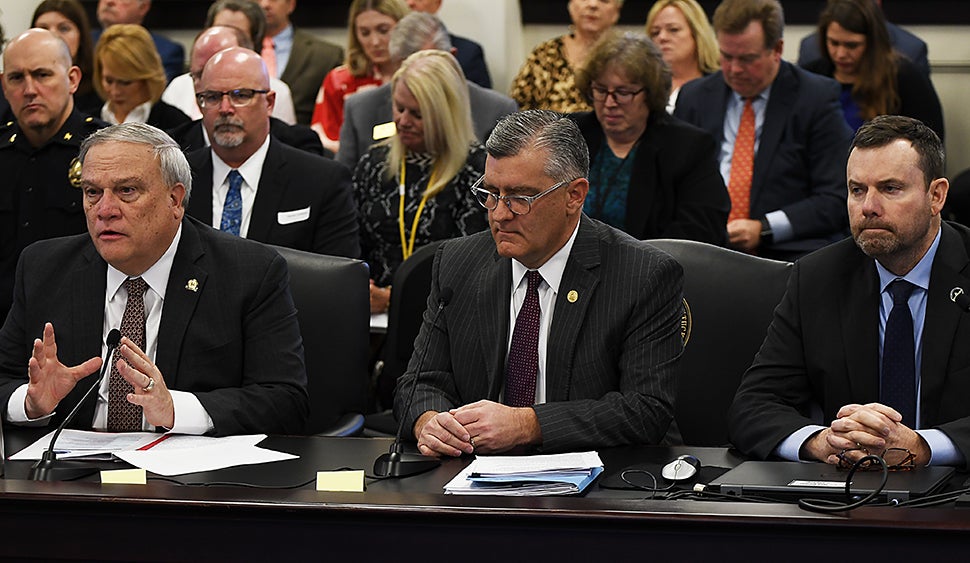Fossil fuels vs. greener energy? KY’s energy tug-of-war on full display in Frankfort
Published 12:37 pm Friday, March 22, 2024

- FRANKFORT, March 21 – (From left to right) Senate President Robert Stivers, R-Manchester; Sen. Robby Mills, R-Henderson; and Sen. Stephen West, R-Paris; present Senate Bill 349, an act relating to energy policy, during Thursday’s House Committee on Natural Resources and Energy meeting. (LRC Public Information)
FRANKFORT — Hours after a House committee declared Kentucky a “sanctuary state” from federal fossil fuel environmental regulations Thursday, Gov. Andy Beshear announced a $1.3 billion project converting coal mine land to a hydropower facility.
Kentucky’s internal tug-of-war between the historically entrenched coal and fossil fuel industry and pushes for a greener future was on full display Thursday.
‘An opportunity to restore hope:’ the Lewis Ridge Pumped Storage Project to change Eastern Kentucky
During his weekly presser, Beshear announced what may be the largest investment in Eastern Kentucky history.
The $1.3 billion investment Lewis Ridge Pumped Storage Project will convert former coal mine land in Bell County into a pumped storage hydropower facility.
It works by using two large pools of water and gravity to create and store up to eight hours of energy that could be used during extreme weather events or peak demand times.

A depiction of the $1.3 billion Lewis Ridge Pumped Storage Project. (Rye Development)
Through Bipartisan Infrastructure Law money, the U.S. Department of Energy is contributing up to $81 million to help Rye Development complete the project.
“President Biden believes that the communities that have powered our nation for the past 100 years should power our nation for the next 100 years,” said U.S. Secretary of Energy Jennifer M. Granholm in a press release.
The Lewis Ridge Pumped Storage Project will take seven to ten years to develop, including five years of construction, but Rye Development CEO Paul Jacob said once it’s operational, it will serve Kentucky for a century, with energy to power 67,000 homes a year.
Over 1,500 jobs will be created during the construction of the project. Rye Development will work with longtime project partner Shaping Our Appalachian Region (SOAR) to prioritize local hiring.
It may be an economic boon to the entire Eastern Kentucky region, which was once a rich energy production area but has recently struggled as coal has been largely abandoned, said Senate President Robert Stivers, R-Manchester.
“This is an opportunity to restore hope,” Stivers said.
‘Playing politics:’ House committee resists federal environmental standards
Thursday morning, the House Natural Resources Committee passed two measures aimed against federal environmental regulations.
Kentucky Republicans have long fought against the Environmental Protection Agency over various rules concerning water, air and fossil fuels.
Many feel threatened by EPA rules targeting greenhouse gas emissions that would require coal and natural gas plants to shut down or shift to other forms of energy generation on an aggressive timeline.
Coal still accounts for an overwhelming majority of the Commonwealth’s electricity generation, according to the U.S. Energy Information Administration.
House Joint Resolution 121 would declare Kentucky a “sanctuary state” from the EPA’s “overreaching regulatory actions on fossil fuel-powered plants.”
Under the resolution, Kentucky would state that it does not have to follow federal regulations concerning fossil fuels or air quality standards. State agencies could not collect fines or penalties on behalf of the EPA for any federal violations.
Committee Chair Jim Gooch Jr, R-Providence, said he got a letter last week advising him that if this resolution passed, the EPA would probably just come down and take over Kentucky’s enforcement of environmental law.
“They were absolutely right,” Gooch said. “They will do that.”
To Gooch, it’s more about making a point. He wants Kentucky to send a message that the federal government can’t “pick and choose” which laws to enforce, referring to the administration’s lack of enforcement of federal immigration law in so called “sanctuary states.”
Rep. Al Gentry, D-Louisville, called it a “ridiculous” resolution.
“I think it’s a clear statement that we really don’t care about clean air,” he said.
Beshear agreed, criticizing the move, which would most likely lead to an EPA takeover, as “silly.” He noted that while the EPA’s timeline may be hard to meet, the federal agency works with communities and often extends deadlines if needed.
“Today we saw a lot of people playing politics,” Beshear said.
The Energy Planning and Inventory Commission
Kentucky may already have an agency that decides whether or not to retire fossil fuel-fired plants, but that didn’t stop the House Natural Resources Committee from approving a bill that would establish a new one.
The Energy Planning and Inventory Commission would be responsible for creating a comprehensive energy strategy for Kentucky, which supporters say the current Public Service Commission has failed to do.
Electric utilities would have to go to EPIC first before submitting an application for retirement with the PSC, adding an extra step of oversight.
Utilities would have to submit a report to EPIC, explaining the impact of a fossil-fuel plant retirement on:
- the reliability of the power supply;
- the ability of Kentucky to meet future demand growth and respond to extreme weather events without the plant;
- local and state economies and revenue; and
- the ability to support current or future economic development.
The report would also include what alternatives should be considered before retirement.
Under the bill, a plant could not be retired until a new form of electric generation met or exceeded the capacity of the retiring plant, unless a utility can prove that “such capacity value and net capability is not necessary to provide reliable service.”
Opponents of the bill argue that the 18-member EPIC board is stacked with special interest groups, like representatives from coal, oil and gas producers and transporters.
The bill states that “further retirement of fossil fuel-fired electric generating resources is not necessary for the protection of the environment or the health, safety, and welfare of the citizens of the Commonwealth.”
The Kentucky Electric Cooperative and East Kentucky Power support the bill, while LG&E and Duke Energy oppose it.
Duke Energy’s Amy Spiller said that when coal plants reach the end of their useful lift, they aren’t burning fuel and become little more than a tax burden on Kentuckians that the plants are no longer serving.
“We can understand that maybe coal plants that are beyond their life may not be that reliable, but I can tell you this—theyre probably as reliable as solar power when the sun’s not shining and wind power when the wind’s not blowing,” Gooch responded.
Beshear also opposed taking authority away from the Public Service Commission and vesting it in a smaller, less representative group.
“I’ve been critical of the federal government about trying to shut down means of production during this period,” Beshear said. “…So I’ve been in just about the same place as some of the people who are talking about this commission, but this commission is not the way to do it.”





